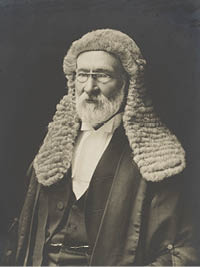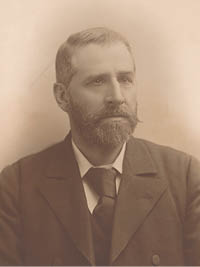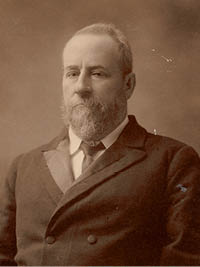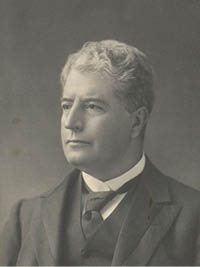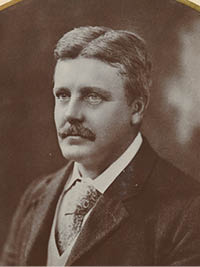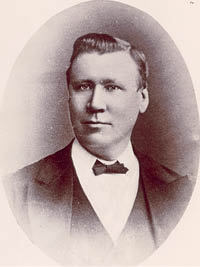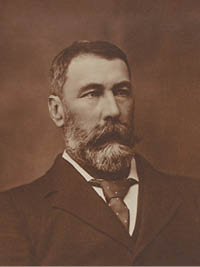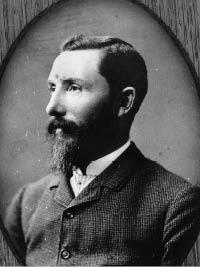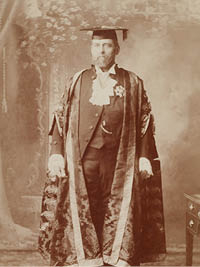On 18 March 1891, to prepare the groundwork for drafting a constitution, the National Australasian Convention appointed three committees: one to address finance, taxation and trade; another to consider the establishment of a federal judiciary; and a third to examine in detail and frame specific provisions to be drafted into a constitution Bill.
The committees drew up reports for a sub-committee that was to draft the constitution. The members of this drafting committee were:
- Sir Samuel Griffith
- Andrew Inglis Clark
- Charles Kingston
They spent the Easter break working through the reports and framing a document that would be accepted by the convention, the colonial parliaments and the people of Australia. They put together the final revision of the draft constitution on board the Queensland Government steamer Lucinda. They received unofficial advice from the following:
- Bernhard Wise
- Edmund Barton
- Sir John Downer
- Andrew Thynne
- Henry Wrixon
Members of the 1897 National Australasian Convention also appointed three select committees to consider and report on finance, the judiciary and constitutional machinery respectively. The committees met privately and worked at resolving the differences of opinion that had emerged during discussions.
The drafting committee comprised:
- Edmund Barton
- Richard O'Connor
- Sir John Downer
On 16 March 1898, after much debate, the convention finally adopted the constitution in the form of the Draft of a Bill to Constitute the Commonwealth of Australia.
Sir Samuel Walker Griffith (1845 - 1920)
Show moreBest known for his pivotal role in drafting agreements that led to Federation and the new nation's first Chief Justice, Sir Samuel was also an important reformer and legislator, a practical and cautious man of words - a legal draftsman, a poet and translator of Dante. Sir Samuel made an outstanding contribution to law and government at an important time in Australian history.
Sir Harry Gibbs writes of the time, saying that:
"When, in the last decade of the nineteenth century, representatives of the Australian colonies, among the most notable of whom was Sir Samuel Griffith, met for the purpose of considering a scheme for a Federal Constitution, they were actuated by what appeared to them to be practical needs and inspired by an ideal. The principal needs which they saw were to provide a common framework for defence and to establish what would now be called a common market for the purposes of trade. The ideal was that the Australian continent should be occupied by only one nation."
Sir Samuel came to the fore in the 1890s when moves for Federation grew strong. His speech at the 1890 Melbourne conference accurately represented him as a cautious lawyer and practical politician. He was particularly influential in the 1891 Sydney convention where he admitted he dominated the discussions: "My work … was very hard, for it fell to my lot to draw the Constitution, after presiding for several days on a Committee, and endeavouring to ascertain the general consensus of opinion."
Alfred Deakin agreed: "As [a] whole and in every clause the measure bore the stamp of Sir Samuel Griffith's patient and untiring handwork, his terse, clear style and force of expression … few even in the mother country or the United States … could have accomplished … such a piece of draftsmanship with the same finish in the same time."
Sir Samuel defended this draft constitution in his July 1891 presidential address to the Queensland branch of the Royal Geographical Society of Australasia on the grounds of patriotism: "In spirit I am as much an Australian as any man."
By the time constitutional discussion was resumed in 1897 Sir Samuel was out of politics, but he continued to advocate Federation. In 1896-1900, he wrote extensively on the subject and corresponded with many delegates to the 1897-98 convention, sending detailed comments to Sir Robert Garran, secretary of the drafting committee.
Sir Samuel, in Melbourne during the Premiers' conference of January 1899, saw all the representatives and travelled back to Sydney with Sir George Reid, perhaps assisting in drafting the decisions. His address in May to the Queensland Federation League had the avowed object of influencing Queenslanders to vote for Federation. Sir John Quick was sure this intervention had been crucial, telegraphing Griffith: "I congratulate you on Federal Voting in Queensland. Thus crowning your long sustained and patriotic labours in the cause of Australian unity."
Sir Samuel was consulted by Sir John Forrest about Western Australia joining as an original State, a question eventually left to the London constitutional deliberations in 1900 when Griffith, as acting Governor, suggested amendments. Although he refused a request from the British government to try to persuade the delegates to accept changes, his support for wider rights of appeal to the Privy Council placed him in a "distinctly equivocal" position. His redrafting of the appeals clause caused bitter clashes with Deakin, Sir Edmund Barton, Charles Kingston and Sir Josiah Symon.
Frustrated, disappointed and confused during his second premiership, Sir Samuel made the transition to the judiciary. He served as Queensland's Chief Justice from 1893 to 1903. Griffith made a lasting professional contribution by codifying the Queensland criminal law, a massive task which occupied much of his spare time in 1896-99. In 1903, after considerable political debate the Judiciary Act (drafted by Sir Samuel) was passed, so inaugurating the High Court of Australia, and he was chosen as first Chief Justice. Sir Samuel was also known as a lifelong advocate of government support for education and scholarships, recognising the vital role early scholarships played in launching his distinguished career.
Sir Samuel died in 1920 and is now remembered in his namesakes - an electorate, a society, a suburb, and a university.
Andrew Inglis Clark (1848-1907)
Show moreAndrew Inglis Clark was born in Hobart Town in February 1848.
He became a barrister, politician and judge. In the 1870s, he became an active member of the local debating and literary societies. He became a prominent member of the Minerva Club where contemporary problems were discussed and debated among members.
Andrew was closely associated with the Federation movement in its early years. The Tasmanian Parliament elected Clark as a delegate on the Federal Council in 1888, 1889, 1891, and 1894 and the Australasian Federation Conference in Melbourne in 1890.
At the Federation Convention of 1891 his draft constitution Bill, which systematised provisions drawn from the American Constitution and the Federal Council Act, was warmly received by delegates from the other colonies.
Although tending to be too literary and verbose, Clark described how the organs of central government would work and proposed a separate federal judiciary, which would replace the Privy Council as the highest court of appeal on Australian law.
A bout of influenza prevented Clark from initially joining fellow drafters on the steamship Lucinda, where his draft was tinkered with but not fundamentally changed: eighty-six of his ninety-six sections found their way into the 1900 Australian Constitution. Interestingly, it was a visit to America that first fanned his interest in Federation. He became impressed by the American Constitution and its democratic and republican ideals, and when he returned to Hobart he was convinced of their suitability for Australia.
Through his experience as business manager of the family engineering firm, he believed Federation was a solution to intercolonial tariff rivalry. His own draft constitution Bill was practically a transcript of relevant provisions from the British North American Act, the United States Constitution and the Federal Council Act, arranged systematically, but it was to be of great use to the drafting committee at the convention.
Henry Parkes received it with reservations, suggesting that "the structure should be evolved bit by bit". George Higinbotham admitted the "acknowledged defects & disadvantages" of responsible government, but criticised Clark's plan to separate the executive and the legislature.
Clark's draft also differed from the adopted constitution in his proposal for "a separate federal judiciary", with the new Supreme Court replacing the Privy Council as the highest court of appeal on all questions of law, which would be "a wholesome innovation upon the American system".
He became a member of the Constitutional Committee and chairman of the Judiciary Committee. Although he took little part in the debates he assisted Samuel Griffith, Edmund Barton and C. C. Kingston in revising Griffith's original draft of the adopted constitution on the Queensland government's steam yacht, Lucinda; though he was too ill to be present when the main work was done, his own draft had been the basis for most of Griffith's text.
Alfred Deakin, The Federal Story (Melbourne, 1963), described Clark at the conference: "Small, spare, nervous, active, jealous and suspicious in disposition, and somewhat awkward in manner and ungraceful in speech, he was nevertheless a sound lawyer, keen, logical and acute."
By 1900, Clark's support of union had waned and, in fact, had turned into opposition. He apparently thought that financial clauses would act deleteriously on small States like Tasmania and withdrew from the Federation movement.
Although this meant that his contribution to Australia's foundation document was not fully recognised, the order, form, substance, and American flavour of the Australian Constitution owed more to Andrew Inglis Clark than any other single individual.
Sir William Deane, the former Governor-General, has fairly dubbed him "the primary architect of our Constitution”.
He died on 14 November 1907 at his home in Hobart.
Charles Cameron Kingston (1850-1908)
Show moreKingston was born in Adelaide, the son of Sir George Kingston, a Protestant Irish-born surveyor, architect and landowner in the early days of British settlement in South Australia and later a member of the first South Australian Parliament.
As a leading supporter of Federation, Kingston was a delegate to the Constitutional Conventions of 1891 and 1897-98 which worked to draft an Australian Constitution.
In 1897, he travelled to London for the Diamond Jubilee of Queen Victoria, where he was made a Privy Councillor and awarded an honorary Doctor of Civil Laws degree by Oxford University, but he turned down the offer of a knighthood. While there, he lobbied senior British politicians in favour of Australian federation.
In 1899, Kingston's government in South Australia was defeated in the House on a Bill relating to the reform of the Legislative Council, leading to Kingston's resignation as Premier.
By this time, however, he was more interested in federal politics, as the six Australian colonies moved towards federation. He was a leading figure in the popular movement for Federation, and in 1900 he travelled to London with Edmund Barton and Alfred Deakin to oversee the passage of the federation Bill through the Parliament of the United Kingdom.
When the Constitution came into effect on 1 January 1901, Barton formed the first federal ministry, and Kingston was appointed Minister for Trade and Customs. In March 1901, he was elected as one of South Australia's seven members of the first Australian House of Representatives.
Kingston was a "high protectionist", favouring very high tariffs to protect Australia's fledgling manufacturing industries. Most of his time as Minister was spent negotiating a customs Bill through both houses of the Parliament, since no one party had a majority in either House and the forces of the Free Trade party resisted his Bill at every stage. His bullying style in negotiating with his opponents made him many enemies.
He was also known as a great social reformer and is noted for introducing legislation that included:
- the first factory regulations
- set wages for set hours
- industrial conciliation
- establishment of the State Bank guaranteeing deposits
- Married Women's Property Act
- female suffrage (second in the word), and
- women's right to stand for Parliament (first in the world).
In July 1903, Kingston resigned suddenly in a fit of anger due to the opposition of John Forrest and Edmund Barton to his attempt to impose conciliation and arbitration on British and foreign seamen engaged in the Australian coastal trade. He never held office again, although Labor offered him a position in Chris Watson's ministry–he turned this down. He remained as Member for Adelaide until his sudden death in May 1908.
Kingston died in Adelaide of a stroke in May 1908. The Federal electoral division of Kingston is named after him.
Sir Edmund Barton (1849-1920)
Show moreSir Edmund was a passionate politician. He was first elected to the Legislative Assembly of New South Wales in 1879, becoming Speaker of the House between 1883 and 1887. After losing the 1887 election, he became a member of the Legislative Council in the same year.
Barton endorsed Henry Parkes' call for Federation made at Tenterfield in 1889, in a speech he made at Lithgow, on 2 November, 1889.
At the Athenaeum Club in the early 1880s Barton met and conversed with the Tasmanian Attorney-General, Andrew Inglis Clark, a passionate spokesman for an American model of Federation. It was not, however, until Barton read reports in the press of the Tenterfield address Henry Parkes gave to a meeting in the Sydney Town Hall that he gave his full and unconditional commitment to Federation.
In March 1891, Barton proposed his blueprint for Federation at the National Australasian Convention. He argued that an elected senate composed of State representatives would effectively balance the powers between the States and a Federal government. Barton also advocated an autonomous Australian legal system, and the necessary abolition of the right of appeal to the British Privy Council. Among others, the Victorian politician Alfred Deakin was impressed by Barton’s speech.
The Convention established a constitutional committee to which Samuel Griffith was appointed chairman, and Henry Parkes, Edmund Barton, Charles Kingston, Alfred Deakin, Andrew Inglis Clark and John Downer were elected members. In turn the committee elected a drafting committee, Griffith, Inglis Clark and Kingston would be responsible for drafting the new Constitution. When Inglis Clark fell sick, Barton’s position was suddenly elevated to the drafting committee for the new constitution.
Working successfully on the formation of Federation Leagues in border communities, Barton became leader of the Australasian Federation League.
Barton re-entered the Legislative Assembly in 1891, only to lose again in 1894. This gave him the opportunity to devote himself more fully to political issues, speaking at the Bathurst Peoples Convention in 1894. He ran for election to the 1897 Federation Convention, elected as the first New South Wales representative
Despite disagreement with George Reid over his proposal that the Constitution Bill be accepted without change, Barton later became reconciled through his change of heart to accept the need for modifications.
At the Constitutional Convention held in Adelaide on 23 April 1897, after steering the draft constitution through detailed discussions Barton said:
'We all lose something; we all gain something, not only in the method and manner of Federation, but our gain is limitless, if we are to consider, as we must, what the outcome of Federation will be to all these colonies.'
Barton was joined by Deakin and Kingston as the three member delegation sent to Westminster to negotiate the Constitution Bill. Barton's legal knowledge was valuable in the appeals to the Privy Council during the Bill's passage.
Although Barton was disappointed that the first draft constitution had not abolished the right of appeal to the Privy Council, it was, nonetheless, an extraordinary feat accomplished in a brief period of three days.
The draft Constitution drew upon the Constitutions of Canada, the United States and Switzerland, as well as the Westminster system. One of the democratic safeguards of the new Constitution, borrowed from the Swiss, was the clause that the Constitution could not be amended except by referendum. Having written a draft Constitution, the Convention members returned to their home States to lobby the governments and win the support of the people.
In July 1894, Barton was defeated for the seat of Randwick. For the next three years he devoted himself entirely to the Federation cause, speaking at over 300 public meetings.
By 1897, Barton was considered leader of the Federation movement of Australia and was elected chairman of the drafting and Constitution committees at the Federal Convention in Adelaide of March 1897 For the next year, Barton worked himself and his colleagues to the point of exhaustion. In May, Barton was nominated to the NSW Legislative Council in order to facilitate the Enabling Act necessary for the referendum. By the Sydney September meeting of the reconvened Convention, Barton was deeply frustrated by the number of amendments imposed by the Legislative Council, most of whom were opposed to Federation.
Throughout the summer of 1898 the drafting committee worked on the Constitution. This time, Barton included the abolition of the right of appeal to the Privy Council. In March, Barton began the long and intense campaign to see the draft Constitution finally succeed at referendum. In April 1898, the referendum narrowly failed in NSW. With the exception of Western Australia, who refrained from holding a referendum until 1900, the draft Constitution was approved by the other colonies. Resigning from the Legislative Council, Barton won the seat of Hastings and Macleay in order to propose a second Enabling Act for a second referendum. In 1899, the voters of NSW finally accepted the draft Constitution.
In 1900, Barton was selected as a delegate to accompany the Constitution Bill to England, where it was to be put before the English Parliament. However, Queen Victoria objected to the name Commonwealth of Australia as it resurrected memories of the English Commonwealth under Oliver Cromwell, though no serious attempt was made to dissuade the Australians from using it. The sticking point for the British was the abolition of the Privy Council as the final court of appeal in the Australian legal system. After much negotiation, a compromise was reached that preserved the identity of the original Constitution. Only non-Constitution matters could be referred to the Privy Council.
In recognition of his status as leader of the Federation movement of Australia, Edmund Barton was appointed Prime Minister of the Commonwealth of Australia on Christmas Day 1900 but this was not without its controversy.
Although it was fully expected that Barton would be selected to be the first Prime Minister to take the people to their first Federal election, the new Governor General Lord Hopetoun instead selected William Lyne Premier of NSW. In a mark of solidarity with Barton, appointed members of Cabinet refused to serve under Lyne. Barton was finally appointed the nation’s first Prime Minister, taking the portfolio of Minister of External Affairs.
The celebrations for Federation in Sydney took place on 1st January 1901. For Barton, however, it was the start of yet another campaign trail as a Federal election now had to be fought and won.
In March 1901, Barton and his entire Cabinet, including old friends and allies, Alfred Deakin, Charles Kingston and Richard O’Connor, were formally approved by the Australian voters. Although only Prime Minster for a little over two and a half years, the Australian Public Service, the instigation of the White Australia Policy, women’s right to vote and the High Court were all established during his term.
Having twice refused a Knighthood, Barton finally accepted a Knight Grand Cross of the Order of St Michael and St George in 1902. In September, 1903, worn out by the responsibilities of being Prime Minister and the long and exhausting federation campaign that preceded it, Barton resigned.
Shortly afterwards Barton was appointed to sit on Australia’s first High Court. For the next 17 years, Barton interpreted the Constitution he had helped to create.
In January 1920, at the age of 70, Edmund Barton died suddenly of heart failure in the Blue Mountains in New South Wales.
Bernhard Ringrose Wise (1858 – 1916)
Show moreBernhard Wise was elected as a representative of New South Wales at the 1897 Federal Convention and was a member of the judiciary committee. He fought for Federation in the referendum campaign of 1898 and at the New South Wales election allied himself with Edmund Barton. In 1898, he was returned as the NSW Member for Ashfield but he left the Free Trade Party because he felt that free trade was being put before federalism, commenting that, "I preferred nationhood to local politics".
He became an energetic advocate of Federation, speaking, travelling and writing as an editorial committee-member of the Australian Federalist. He was a delegate to the Australasian Federal Convention of 1897-98 where his liberal instinct, constitutional training and persuasive advocacy made a valuable contribution.
He was a very strong supporter of equal State representation in the Senate, and suggested the double dissolution proposal for the breaking of deadlocks between the Houses. Alfred Deakin placed him in "the first rank of men of influence in the Convention".
Wise - who had been NSW Attorney General - was unsuccessful in his attempt to enter the first Federal Parliament when he failed in 1901 to win the country seat of Canobolas. There he encountered an antagonism to the "city" barrister and was labelled a protectionist due to his links with NSW Premier Lynne and Edmund Barton.
He was to comment later in life that, "My failure in Sydney has been so complete—my qualities those which Australia does not recognise, my defects those which Australians dislike most."
However, when he died, William Holman said of Wise:
"There is hardly anything in our public life which we have to consider today that cannot be traced back to his brilliant mind and clear foresight … [Wise] held undisputed supremacy as the foremost debater, foremost thinker and foremost public man in the life of New South Wales".
Wise was NSW Attorney-General from September 1899 to June 1904, and from July 1901 was also Minister of Justice. He began to put through some of his ideas for social reform and succeeded in passing important legislation, including the Industrial Arbitration Act (1901), the Early Closing Act (1899), the Old-age Pensions Act (1900) and the Women's Franchise Act (1902). In October 1900, he moved to the NSW legislative Council to pilot the Arbitration Bill through. He was acting-Premier for part of 1903-04.
In 1906, he travelled to South America where he contracted malaria which affected his health for the remainder of his days. Most of his time was spent in England and in May 1915 he was appointed Agent-General for New South Wales.
Wise died suddenly in London in 1916.
John William Downer (1843-1915)
Show moreBy the Sydney Convention of 1891, Downer was one of the leading conservative spokesmen on federation matters. His interest was the future Upper House's role as a States' house: Downer supported those who wanted a powerful Senate similar to that of the US.
The principle of responsible government was not to overrule States' rights. He opposed viewing the Senate as being like existing Legislative Councils or the House of Lords, and waned to ensure that it attracted the best intellects, by offering its members a sense of authority and power.
At the Australasian Federal Convention of 1897 in Adelaide, Downer was a member of the constitutional and drafting committees, some of the work of which was done in his house where Edmund Barton was staying. Downer wished to preserve the clauses of the 1891 Bill relating to appeals to the Privy Council. He argued that the Constitution should let the new nation manage its own judicial affairs. When these clauses were whittled away, he questioned whether the delegates “would ever get out of swaddling clothes”.
In reply, Simon Fraser quipped that they were not there to “cut the painter” with Great Britain. Sir John replied: “We have come to the conclusion that we may cease to be provincial, and form the foundation of a nation. We do not propose in any way to separate from the British Crown, in fact we look to it with reverence. We consider ourselves the same people, but the very essence of the difference is that we think that we can make laws which will suffice us; in other words, to put it colloquially, we think we can manage our own affairs.”
In the elections for the first Commonwealth parliament, Downer was returned as one of the six South Australian senators. He was so interested in the constitutional position of the Senate, that one colleague remarked that Downer reminded him of the gentleman who under all circumstances would drag King Charles's head into the discussion. While Downer doggedly defended the Senate's constitutional rights—and he believed those rights extended to the removal of governments—he was also a firm believer in the importance of convention.
He fought a move in the Senate to delay passage of a Supply Bill: “In every constitutionally governed State the practice has been to pass Supply Bills practically as a matter of course', and during the controversy over Lord Hopetoun's resignation he again cited convention when he pleaded that 'It is a well understood principle of constitutional government that it is undesirable for the Governor General to take an active part in debatable politics'.
Downer was a politician of strange contrasts. He often took up positions which, at least for a self-styled nineteenth-century conservative, did not quite fit this image: witness his promoting women's rights and his opposition to appeals to the Privy Council. His abhorrence of jingoistic racism was a rare virtue in the first Commonwealth parliament. Despite his affectionate loyalty to the British Crown and England, he devoted much time to creating an independent Australia.
Alfred Deakin described him as “bull-headed, and rather thick-necked…with the dogged set of the mouth of a prize fighter and smallish eyes”. But he found him to be suave, clear and effective and believed that only “reserve and indolence” had prevented him from playing a far greater part in the Federal movement.
Sir John died in 1915. The suburb of Downer in Canberra is named after him.
Richard Edward O'Connor (1851 –1912)
Show moreO'Connor was born in Sydney and graduated as a lawyer in 1871. He became a Clerk to the Legislative Council in NSW, studied law, and was called to the bar in 1876. He was known as a sound lawyer and he built up a successful practice. He was also a well-known journalist writing for Irish-Australian and Catholic magazines.
A Protectionist, O'Connor was a member of the New South Wales Legislative Council 1887–98. He was Minister for Justice 1891–93 and Solicitor-General 1893. He was made a QC in 1896, and in the same year was a member of the People's Federal Convention held at Bathurst.
O’Connor was an earnest advocate for federation and was elected one of the New South Wales’ representatives for the convention of 1897–98.
He was a member at this convention with Sir Edmund Barton and Sir John Downer of the drafting committee which prepared the federation Bill. This Bill, along with some amendments, eventually became the federal Constitution.
O'Connor was elected to the Australian Senate in 1901 as a Senator for New South Wales and he was made vice-president of the Executive Council in 1901-03 in the Ministry of Edmund Barton. In 1903, he was appointed as a foundation Justice of the High Court of Australia, where he served until his death in 1912.
Andrew Joseph Thynne (1847-1927)
Show moreAndrew Thynne was described a “brainy and industrious lawyer”, and he formed a partnership with Sir Edward Macartney, representing some of Queensland's largest corporations.
In January 1882, Thynne was appointed to the Legislative Council. He remained a Member until its abolition in 1922. He was the only Councillor in Cabinet in 1888-90 when he served as Minister of Justice in the McIlwraith and Morehead governments. In subsequent Cabinets he was Minister without portfolio (1893-94), Postmaster-General (1894-97) and Secretary for Agriculture (1896-98); he helped to establish the Queensland Agricultural College at Gatton.
Thynne represented his colony at the National Australasian Convention in Sydney in 1891, at a colonial conference held in Ottawa, Canada, in 1894 and at a postal conference in Hobart in 1895. In March 1898, he resigned his portfolio in order to give more time to his other professional interests.
As leader of the government in the Legislative Council and principal of the firm handling the Chillagoe Pty Co.'s legal interests, Thynne argued successfully for government assistance to his corporate client. In late 1916 he clashed acrimoniously with Premier T. J. Ryan over the attempted transformation of the company into a State-owned mining enterprise. He accused Ryan of forcing his clients to sell '”at a wrecker's price”. The Bill associated with the sale was defeated in the Council.
Thynne was appointed to the first Senate of the University of Queensland in April 1910, then elected Vice-Chancellor in 1916 and Chancellor in 1925. A traditionalist to the core, he argued successfully against fellow Senate member A. H. Barlow who advocated that criteria other than matriculation be used for university entry. As vice-chancellor, Thynne reaffirmed the position of the original Senate that university professors should not be involved in politics.
As a speaker, his debating skill, command of language, personal charm and persuasiveness compensated for his soft voice and his tendency to touchiness.
With his friend Archbishop (Sir) James Duhig by his bedside, Thynne died on 27 February 1927 at Thoonbah, his home in Highgate Hill. Duhig praised him as “an ideal adviser in the many weighty matters of State and private interest with which he was called to deal”
Sir Henry Wrixon (1839-1913)
Show moreSir Henry Wrixon was born on 18 October 1839 in Dublin, Ireland. His family arrived in Melbourne in 1850. He was educated at Portland and entered the University of Melbourne in 1855. In 1857, he left for Dublin where he earned the reputation for being a good debater. He was called to the Irish Bar in 1861 but returned to Victoria in 1863.
In 1868, Sir Henry won a seat in the Legislative Assembly and was known as a radical reformer of the land laws and the Legislative Council. He became member for Portland in May 1880. In 1886, he became Attorney General in the D. Gillies-Deakin ministry.
Sir Henry led for the Crown in the Ah Toy case in 1888 but lost on a majority judgment. He was made a QC in 1890 and then he left for London to appeal to the Privy Council which reversed the decision but left unexplored the constitutional issue of the colonial government's power to exclude aliens. He returned a hero.
He was a delegate to the Federal Convention in 1891 and a year later he was created KCMG. In May 1892, Wrixon was defeated narrowly by Thomas Bent for the Speakership. He was appointed a delegate to the Colonial Conference in Canada in 1894 with the additional commission of investigating socialist movements.
He resigned from the Legislative Assembly and became a member of the Legislative Council in 1896 for the South-Western Province. He was appointed president of the Council from 1901 until his retirement in June 1910.
As a member of the 1891 National Australasian Federation Convention, Wrixon tried to define clear relations between the two Houses.
His comments on the draft Bill were described as remarkable for their “almost prophetic insight into the modifications that would be necessary before the Bill could be wholly acceptable”. However, in 1897, he missed election to the Federal Convention by one place; Henry Bournes Higgins, who ran tenth, was upset that Wrixon – “a man of such culture and courtesy,” as he described him and so well qualified as a candidate – denied a place.
Wrixon's most admired characteristics were his sincerity and eloquence. Deakin described him as “loveable and entirely trust-worthy … animated by the sincerest and most unselfish desire to serve his country”.
Wrixon consistently stood for political equality: he supported the Hare system of proportional representation as early as 1873, advocated female suffrage, strongly supported abolition of plural voting, and condemned the class basis of the council, but he did not support payment of members.
Similar principles of justice and fair-dealing led him to argue for the Saturday half-holiday in 1869 and attempts to compensate workers for injuries caused by the negligence of others.
Wrixon's wealth, social position and religion were threads weaving him into the conservative 'establishment'. He was progressive in abstract principles, but the gulf between his life and that of the everyday world led him to harsh incomprehension in practical dealings with the poor. His criminal law amendment bill of 1871 not only introduced flogging for criminal attacks on women and children, but also whipping for boys who threw stones, broke windows or extinguished lamps. In the depression of the 1890s, he condemned the unemployed for holding street-meetings to demand public works.
Wrixon's fear of socialism is expressed in his later writings, The Pattern Nation and Religion of the Common Man. In 1895, he told a friend on his History of the Rise and Influence of the Spirit of Rationalism in Europe, that “'I fear you will only reach mankind to set them adrift”, and implored him to examine the great political question of the day, universal suffrage, which nothing could prevent but whose consequences were likely to be “gloomy, almost fatal”.
Wrixon died of heart failure in 1913.



